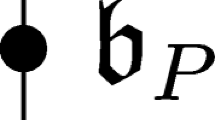Abstract
An explicitly frame related interpretation of a very general more for less result is used to establish a correspondingly general class of frame related switching results. These are used in turn to show how preference reversals of kinds found by Allais and others may not only be essentially non-paradoxical in character, but can be expected to be frequently observed, even under conditions of certainty and of complete information.
Similar content being viewed by others
References
M. Allais (1953) ArticleTitleLe comportement de 1’homme rationnnel devant le risque: critique des postulats et axioms de 1’Ecole Americaine Econometrica 21 503–546
M. Allais O. Hagen (Eds) (1979) Expected Utility Hypotheses and the Allais Paradox D. Reidel Dordrecht, Holland
H. Arsham (1992) ArticleTitlePost optimality analysis of the transportation problem Journal of the Operational Research Society 43 IssueID2 121–129
Baumol, W.J., Panzer, J.C. and Willig, R.D. (1982). Contestable Markets and the Theory of Industrial Structure. Harcourt Brace Jovanovich.
W.J. Baumol R.D. Willig (1986) ArticleTitleContestability: developments since the book Oxford Economic Papers 38 9–36
C.H. Borch J. Mossin (Eds) (1968) Risk and Uncertainty Macmillan New York
R.D. Cairns (1996) ArticleTitleUncertain contestability Journal of Economic Behaviour and Organization 30 IssueID1 125–131
Carlin (1990) ArticleTitleIs the Allais paradox robust to a seemingly trivial change of frame? Economics Letters 34 241–244
A. Charnes W.W. Cooper (1961) Management Models and Industrial Application of Linear Programming Wiley New York
A. Charnes S. Duffuaa M.J. Ryan (1980) ArticleTitleDegeneracy and the more for less paradox Journal of Information and Optimisation Sciences 1 IssueID1 52–56
A. Charnes S. Duffuaa M.J. Ryan (1987) ArticleTitleThe more for less paradox in linear programming European Journal of Operational Research 31 194–197
A. Charnes D. Klingman (1971) ArticleTitleThe more for less paradox in the distribution model Cahiers du Centre d’Etudes de Recherche Operationelle 13 IssueID1 11–22
S.H. Chew W. Waller (1986) ArticleTitleEmpirical tests of weighted utility theory Journal of Mathematical Psychology 30 55–72
Conlisk (1989) ArticleTitleThree variants on the Allais example American Economic Review 79 392–407
W. Edwards (Eds) (1992) Utility Theories, Measurement and Applications CUP Chicago
A. Gupta M.C. Puri (1995) ArticleTitleMore (same)-for-less paradox in the minimal cost network flow problem Optimisation 33 167–177
J.D. Hey (1993) Current Issues in Microeconomics Macmillan New York
Howard, R.A. (1992). In praise of the old time religion, in Edwards 1992.
D. Kahneman A. Tversky (1979) ArticleTitleProspect Theory: an analysis of decision under risk Econometrica 47 263–291
K.R. MacCrimmon (1968) Descriptive and normative implications of the decision theory postulates C.H. Borch J. Mossin (Eds) Risk and Uncertainty Macmillan New York
Machina, M.J. (1993). Choice under uncertainty: problems solved and unsolved, in Hey 1993.
MacCrimmon, K.R. and Larsson, S. (1979). Utility theory: axioms versus paradoxes, in Allais, M. and Hagen, O. (eds).
H. Raiffa (1968) Decision Analysis: Introductory Lectures on Choice Under Uncertainty Addison-Wesley New York
M.J. Ryan (1994) ArticleTitleConstrained gaming approaches to decision making under uncertainty European Journal of Operational Research 77 70–81
Ryan, M.J. (1996). Constrained game approaches to representations and resolutions of Allais’ paradoxes, Hull Economic Research Paper 236, presented at the Xth Italian Congress on Game Theory, Bergamo, June.
Ryan, M.J. (1997). The distribution model, the more for less (Nothing) paradox and economies of scale and scope: some nonlinear extensions, 9pp., Forthcoming Proceedings of the International Conference on Discrete Mathematics and Applications. Delhi, November 1998.
M.J. Ryan (1998) ArticleTitleConstrained games, intervening duality and experimenter experiment interactions European Journal of Operational Research 110 IssueID2 326–341
M.J. Ryan (2000a) ArticleTitleThe distribution model, the more for less (Nothing) paradox and economies of scale and scope European Journal of Operational Research 121 IssueID1 92–104
M.J. Ryan (2000b) ArticleTitleEconomies of scale and scope, contestability and windfall profits and regulatory risk Manchester School 68 701–722
M. Shubik (1982) Game Theory in the Social Science MIT Press MA
P. Slovic A. Tversky (1974) ArticleTitleWho accepts the savage’s axioms? Behavioural Science 19 368–373
W.G. Shepherd (1984) ArticleTitleContestability vs. competition American Economic Review 74 IssueID4 572–587
W.G. Shepherd (1995) ArticleTitleContestability vs. competition—once more Land Economics 71 IssueID3 299–309
C. Starmer R. Sugden (1993) ArticleTitleTesting for juxtaposition and event splitting effects Journal of Risk and Uncertainty 6 234–254
W. Szwarc (1971) ArticleTitleThe transportation paradox Naval Research Logistics Quarterly 18 185–202
A. Tversky (1975) ArticleTitleA critique of expected utility theory: descriptive and normative considerations Erkenntis 9 163–173
Author information
Authors and Affiliations
Corresponding author
Rights and permissions
About this article
Cite this article
Ryan, M.J. Framing, Switching and Preference Reversals. Theor Decis 57, 181–211 (2004). https://doi.org/10.1007/s11238-005-0281-0
Published:
Issue Date:
DOI: https://doi.org/10.1007/s11238-005-0281-0




